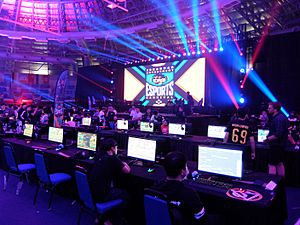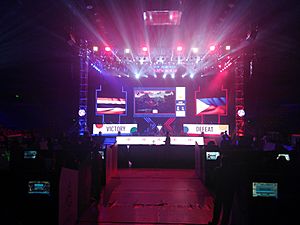Electronic sports facts for kids
Electronic sports, often called esports, are video games played in organized competitions. Think of it like traditional sports, but with video games! Some popular esports games include Counter-Strike, League of Legends, Dota 2, and StarCraft. Players compete online or at special events called LAN parties.
There are big leagues and tournaments for esports, like the Cyberathlete Professional League and World Cyber Games. Top players can win thousands of US Dollars in prize money. For example, in Korea, StarCraft has many highly competitive players. Esports has been around since the early days of arcades, where players would compete for the top score. Game makers like Epic Games have even offered huge prize pools, like $100 million in 2019 for esports participants.
Contents
Is Esports a Sport?
Whether competitive video gaming should be called a "sport" is a topic many people discuss. Those who say it is a sport argue that esports are a fast-growing type of competition. They require careful planning, quick decisions, and skillful actions.
Others believe that true sports need physical fitness and training. They prefer to call esports a "mind sport" because it mostly uses mental skills. Even the former president of ESPN, John Skipper, said in 2014 that esports are a competition, "not a sport."
However, some countries officially recognize esports as a sport. Russia was the first to do so on July 25, 2001. China also recognized esports as a real sport in 2003. By 2019, China even made esports players an official job!
History of Esports
The very first known video game competition happened on October 19, 1972. It was at Stanford University for a game called Spacewar. Students competed in an "Intergalactic spacewar olympics." The winner received a year's subscription to Rolling Stone magazine.
In 1974, Sega held a big tournament in Japan called the All Japan TV Game Championships. This event helped make video games more popular. Later, in 1980, Atari held the Space Invaders Championship. More than 10,000 people across the United States joined, showing that competitive gaming was becoming a popular hobby.
A game called Street Fighter II (1991) changed competitive gaming. Before this, players usually competed for the highest score. But Street Fighter II made players challenge each other directly, face-to-face. This led to the popular multiplayer and deathmatch modes we see in many action games today. The success of fighting games like Street Fighter helped start the international Evolution Championship Series (EVO) tournament in 1996.
The 1990s also saw other big tournaments. The 1990 Nintendo World Championships traveled across the United States. Nintendo held another World Championships in 1994 for the Super Nintendo Entertainment System.
In the 2010s, esports grew a lot. More people watched, and prize money increased. Many big tournaments started during this time, including the World Cyber Games and Intel Extreme Masters.
Video game companies also started to support esports more. Nintendo hosted the Wii Games Summer 2010, which had over 400,000 players. In 2014, Nintendo held a Super Smash Bros. for Wii U tournament at the Electronic Entertainment Expo (E3). Game developers like 343 Industries (for Halo) and companies like Blizzard Entertainment and Riot Games started their own college esports programs.
Since 2013, some universities in the United States, like Robert Morris University Illinois, have recognized esports players as official athletes. They even offer athletic scholarships! In 2017, a company called Tespa offered $1 million in scholarships and prizes for college esports clubs.
The number of people watching esports events in person has also grown. In 2013, the Season 3 League of Legends World Championship sold out the Staples Center. The 2014 League of Legends World Championship in Seoul, South Korea, had over 40,000 fans! In 2015, the first Esports Arena opened in Santa Ana, California. It was the first building in the United States made just for esports.
Esports and the Olympic Games
Many people see the Olympic Games as a way to make esports even more recognized.
In January 2022, the International Olympic Committee (IOC) announced its first head of virtual sport. This person's job is to help develop virtual sports for the Olympics. They also oversee the Olympic Virtual Series, which is the IOC's first official non-physical sports event. This series has included virtual baseball, cycling, rowing, esailing, and motorsports.
In February 2022, the Commonwealth Games Federation said that esports would be a test event at the 2022 Commonwealth Games. It might even become a medal event at the 2026 Games. The first Commonwealth Esports Championship had its own medals and included games like Dota 2, eFootball, and Rocket League.
Following the 2021 Olympic Virtual Series, the IOC and the Singapore National Olympic Council held the first Olympic Esports Week in Singapore in June 2023. Games featured at this event included:
- Tic Tac Bow (archery)
- WBSC eBaseball: Power Pros (baseball)
- Chess.com (chess)
- Zwift (cycling)
- Just Dance (dancing)
- Gran Turismo (motor sport)
- Virtual Regatta (esailing)
- Fortnite (sharpshooting)
- Virtual Taekwondo (taekwondo)
- Tennis Clash (tennis)
Health for Esports Players
Most esports games require players to sit for long periods. This can lead to concerns about a sedentary lifestyle, meaning not moving much. One study found that professional and amateur esports players often play for 24–25 hours each week. Sitting for so long can cause eye fatigue and lower back pain if posture is poor. Bad posture can also lead to headaches.
Sitting too much is a concern for health researchers. Spending more than 6–8 hours a day sitting has been linked to a higher risk of heart problems. Because of this, some esports teams, like T1, work with sports brands like Nike. They encourage players to exercise and provide training to help improve their gaming skills and overall health.
Besides physical health, players' mental health is also important. Studies show that esports competitors can face a lot of psychological stress. This is especially true for amateur players who want to win big but might not be fully prepared. High stress levels can lead to mental health issues and poor decision-making. The esports world can have a high rate of burnout due to stress. Some teams, like Misfits, have even hired psychologists to help players deal with stress and anxiety.
Images for kids
-
Players competing in a League of Legends tournament
-
Attendees of the 1981 Space Invaders Championships attempt to set the highest score
-
The League of Legends World Championship is an annual League of Legends tournament that rotates its venues around the world.
See also
 In Spanish: Deportes electrónicos para niños
In Spanish: Deportes electrónicos para niños
 | Bayard Rustin |
 | Jeannette Carter |
 | Jeremiah A. Brown |









